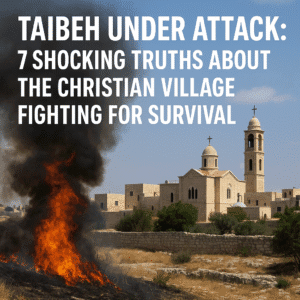While the world’s gaze remains fixed on Gaza, a quieter, insidious crisis threatens to extinguish one of Christianity’s oldest living roots. In the highlands near Ramallah, the Palestinian village of Taibeh – ancient Ephraim, where the Gospels say Jesus sought refuge – is under siege. Its Christian residents, heirs to millennia of faith, now face escalating violence from nearby Jewish settlers, met with alarming passivity by Israeli forces.
Sacred Ground Violated:
The attack wasn’t an isolated incident, but a terrifying crescendo. Settlers deliberately set fires near the revered 5th-century Church of Al-Khader (St. George) and the ancient Byzantine cemetery – sites sacred not just to Taibeh, but to global Christian heritage. This arson followed weeks of intensifying aggression: olive groves, the village’s economic lifeblood, vandalized; farmers barred from their own land at gunpoint. The message is chillingly clear: your presence, your history, your livelihood are not welcome.
A Cry from the Shepherds:
The village’s three parish priests – Latin, Greek Orthodox, and Melkite – issued a desperate joint appeal. They describe the eastern flank of Taibeh transformed into “an open target” for expanding illegal settlement outposts, operating “under the protection of the Israeli army.” Their plea cuts through political noise: send international and ecclesial observers now. Document the damage. Bear witness before it’s too late. The presence of Israeli soldiers during attacks, standing idly by, underscores a devastating complicity that fuels the settlers’ brazenness.
Roots of Fear, Pattern of Aggression:
Taibeh’s pain isn’t new. It began in 1977 with the illegal seizure of its land for the Rimonim settlement. Roads carved for settlers swallowed more ancestral farms. Recent weeks saw settler violence erupt across the West Bank – homes and vehicles torched in Ein Samia and Kufr Malik, vital ancient aqueducts destroyed, and four Palestinian youths killed while resisting. The attack on Taibeh’s Christian core fits a brutal pattern: erase Palestinian presence, fragment communities, seize land.
The Unseen Crisis:
Taibeh’s greatest fear resonates beyond the scorched earth and desecrated graves: invisibility. As Gaza commands headlines, the systematic erosion of this uniquely ancient Christian community risks being overlooked. These families, living peacefully alongside Muslim neighbors for generations, embody a continuity dating back to the earliest followers of Christ. Their struggle isn’t just about property or safety; it’s about preserving a living, breathing fragment of Christian history against calculated erasure.
The Human Insight:
There’s a profound dissonance here. Taibeh-Ephraim represents sanctuary – a place Jesus chose for refuge. Now, its descendants find no sanctuary from violence enabled by state inaction. The destruction of olive groves isn’t mere vandalism; it’s the severing of a deep connection to the land cultivated for centuries, a deliberate attack on identity and sustenance. The priests’ call isn’t just for political intervention; it’s a plea for the world to see the human cost of impunity, to recognize that the loss of Taibeh would be a devastating tear in the rich tapestry of global Christian heritage. Their survival hinges on the world refusing to look away.

You must be logged in to post a comment.